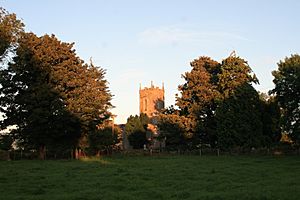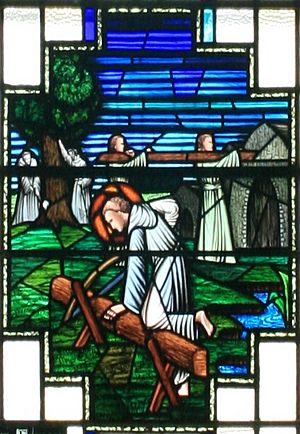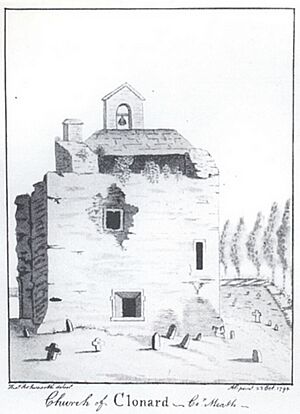Clonard Abbey facts for kids
Clonard Abbey was a very old monastery in Ireland. It was built a long time ago, during the medieval period. You could find it near the River Boyne in a place called Clonard, in County Meath. Its name in Irish, Mainistir Chluain Ioraird, means "Erard's Meadow."
Contents
The Start of Clonard Abbey
How Saint Finnian Founded the Monastery
Clonard Abbey was started around the year 520. A holy man named Saint Finnian founded it. He first built a small hut, or "cell," there. Stories from long ago say an angel guided Finnian to this spot. The angel told him it was a special place. Saint Finnian had traveled a lot and learned from other monasteries. He used what he learned to set up Clonard. He passed away around 549 and was buried at the site.
Famous Students at Clonard
During the 500s, Clonard became a very important learning center. Many famous people in Irish Christianity studied there. These students later became known as the Twelve Apostles of Ireland. They were important leaders who helped spread Christianity.
Clonard's Location and Challenges
Clonard was built on the Esker Riada. This was Ireland's main road from east to west in early medieval times. This location made the monastery very important. However, it was also on the border between two kingdoms. These kingdoms, Leinster and Meath, sometimes fought each other.
Clonard's Importance and Decline
From the 700s, different powerful families took control of Clonard. By the mid-800s, it was the most important church in the middle of Ireland. The leader, called the abbot of Clonard, guided the clergy in the midlands. This was similar to how the abbot of Armagh led the clergy in the north. At its busiest time, a song about Finnian said the monastery's school had 3,000 students. They were all learning about religion.
Attacks on the Abbey
Clonard Abbey faced many challenges over the years. In 764, a large part of the abbey burned down. Like many monasteries in Ireland, Clonard suffered from Viking raids. These attacks happened from the 800s to the 1000s. In 838, the Danes attacked and killed many clergy members. They came back again in 888. In 939, King Ceallachan of Cashel, with help from the Danes, robbed the abbey. In 970, Donell, son of Murcha, also attacked and burned Clonard.
Clonard as a Diocese
Becoming a Church Center
In 1111, at a meeting called the Synod of Ráth Breasail, Clonard became the center of a new church area. This meant it was the main church for several smaller areas. This importance was confirmed again in 1152 at the Synod of Kells.
More Attacks and Changes
In 1113, Connor, the King of Munster, attacked Meath. He took all the valuable things that had been stored safely in the abbey church. In 1143, a fire accidentally destroyed a large part of the abbey and its entire library. The abbey and town were attacked and burned again in 1170. This time, M'Murcha, with help from Earl Strongbow and the English, was responsible. After being rebuilt, it was burned once more in 1175.
That same year, Walter, son of Hugh de Lacy, built a new monastery. It was an Augustinian monastery, likely on the ruins of the old one. Clonard started to become less important during the 1100s. In 1202, a Norman bishop moved the main church center from Clonard to Trim. This new area was called the Diocese of Meath.
What Remains Today
Today, very little of the original Clonard Abbey site remains. If you look from above, you can still see the outlines of some old walls. You can also see other earthworks in the ground.
See also
 In Spanish: Abadía de Clonard para niños
In Spanish: Abadía de Clonard para niños
 | Janet Taylor Pickett |
 | Synthia Saint James |
 | Howardena Pindell |
 | Faith Ringgold |




